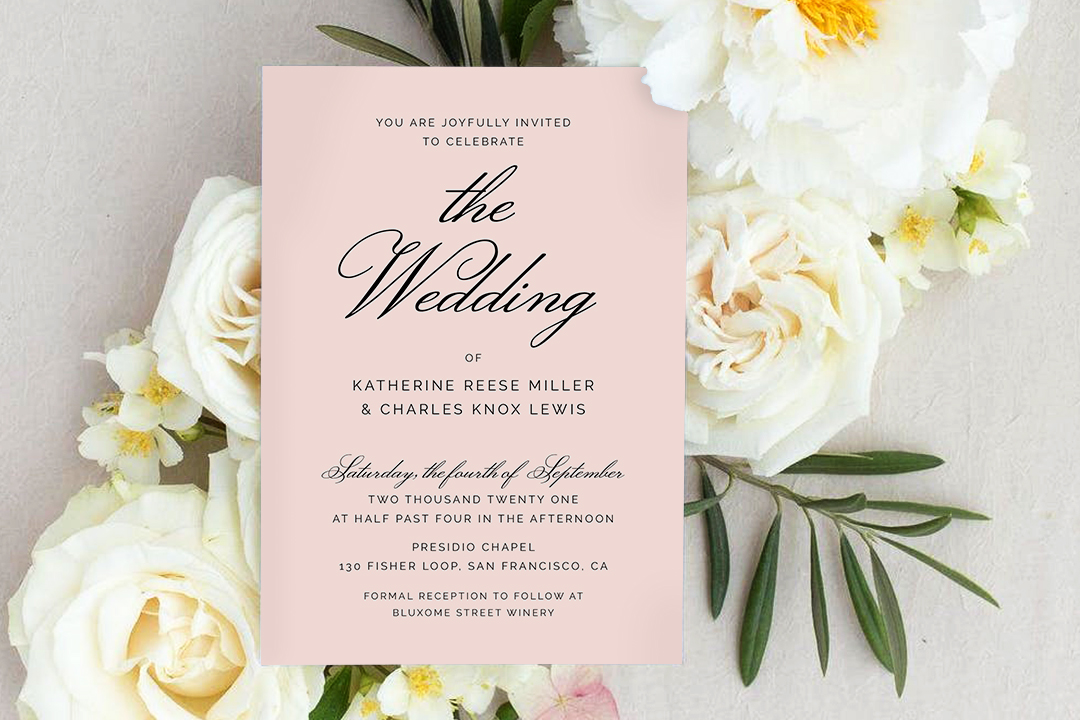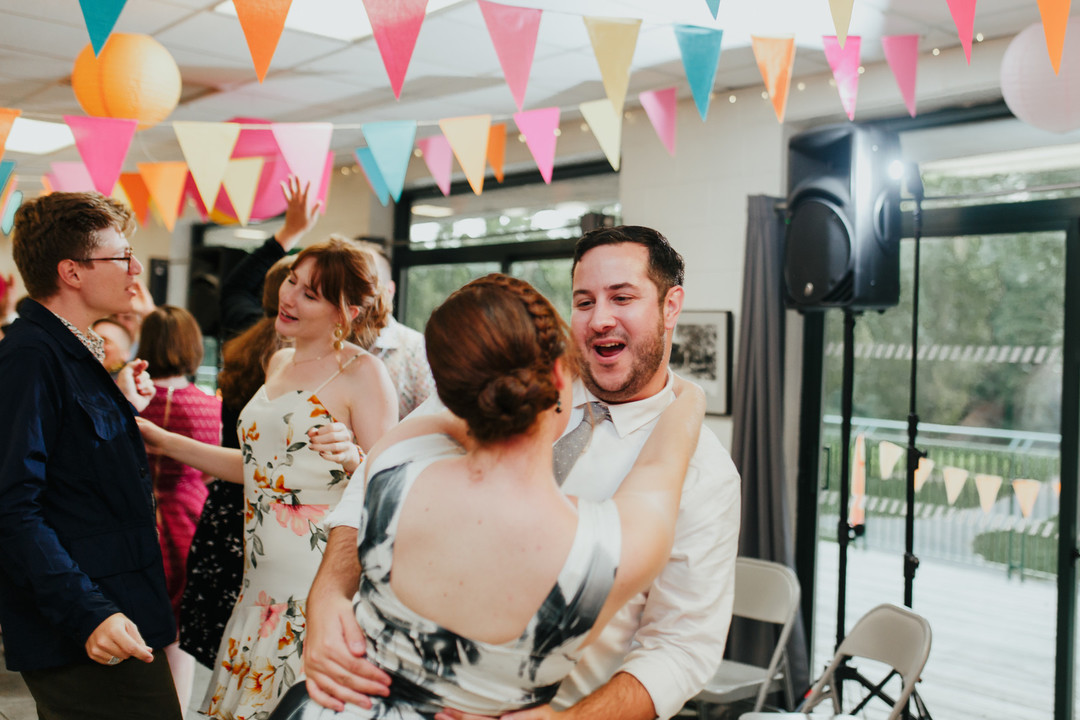- Expert advice/
- Wedding planning 101/
- Wedding planning questions/
- The Pros and Cons of Inviting Plus-Ones To Your Wedding
- Wedding planning questions
The Pros and Cons of Inviting Plus-Ones To Your Wedding
There’s no right or wrong way to handle plus-ones, but weighing the benefits (and drawbacks) might help you and your partner reach a decision.
Last updated February 5, 2024

The First Look ✨
- Allowing plus-ones is a great way to make sure that all of your guests are comfortable. It also saves you from the awkwardness of having to explain yourself.
- For those who are in it for the celebration, allowing plus-ones is a simple way to add numbers to your party.
- Don’t forget that adding plus-ones means that you’ll need to work with a bigger budget.
- If you’re considering only allowing plus-ones for a few guests, you run the risk of having the others feel left out.
With the many changes that weddings have endured in the last 18 months, plus ones for guests have been a common point of discussion (and contention). Should everyone be given a plus one? Is it fair to only include plus ones for guests who are engaged or married? What do you do if someone asks to bring a plus one?
These are just a few of the considerations that many couples are having in regards to letting your guests bring someone. According to Zola’s 2022 wedding planning survey, The First Look Report, approximately 26 percent of couples are allowing plus ones for everyone, while around 60 percent are only inviting plus ones for those in serious relationships.
So, how do you know where to draw the line? And, most importantly, how do you decide what’s best for your big day? Weighing pros and cons is a good place to begin.
The Pros of Inviting Plus-Ones To Your Wedding
It Adds a Layer of Comfort
It’s likely that you have numerous friends and relatives who might not know many people at your wedding. By allowing a plus one, you’re putting those guests at ease, as well as increasing the chances of them having a good time. For those who are extremely dedicated to the comfort of their guests, this might be something to consider when making both planning and financial decisions. If you’re only allowing plus ones for a select few, make sure that you pay special attention to those who might feel removed from the rest of the group.
You Won’t Be Stepping on Anyone’s Toes
While it’s not your job to please everyone, there’s often a generalized assumption (though we’re not quite sure why) that a wedding guest is obligated to bring a plus one. If you don’t feel strongly one way or another, allowing plus ones for everyone is a simple way to appease even the more difficult guests. This courtesy also saves you from the discomfort of having to say no or trying to explain yourself when people come asking questions.
It Can Lead to a Bigger Celebration
If your motto is “the more the merrier,” allowing plus ones is probably the way to go. When it comes to larger weddings, you won’t be spending a lot of dedicated time with each individual guest, so who they bring becomes a little less important. It also helps fill that void, so that fewer guests feel like they didn’t get enough quality time with the couple. It’s rare that people complain when they’re too busy having a good time.
While these reasons alone are quite compelling, it’s important to also consider the cons.
The Cons of Inviting Plus-Ones To Your Wedding
It’s Significantly More Expensive
While not everyone brings a plus one, many of your guests probably will want to. That means you’ll need more food, more table settings, and a bigger dance floor. While these costs might not seem significant on an individual scale, they really add up. The courtesy of allowing plus ones is also a little harder to financially plan for, since people often decide whether or not they’re coming to the wedding long before they consider whether or not they’re going to bring someone.
You Run the Risk of Unruly or Unlikeable Guests
While it’s not likely that your loved ones will invite someone with questionable morals to your gathering, there’s always a bit of a risk when you allow every person on your guest list a plus one. While this might not eliminate the need for plus ones altogether, it’s definitely something to consider as you decide which guests should be allowed a plus one. This point particularly applies to smaller celebrations where the odd person out might draw more unwanted attention.
Some People May Feel Left Out
When it comes to plus ones, most couples have to draw the line somewhere. By allowing plus ones, you put yourself in the position of making some difficult decisions, such as limiting plus ones to those who are married or in a long-term relationship. On the flip side, some of your guests might feel similarly if they can’t find someone to bring in time for your big day. While eliminating plus ones doesn’t get rid of all of the awkwardness for your guests, it’s definitely something worth thinking about.
In conclusion, choosing whether or not to invite plus ones is a fine balance. While there are solutions that might seem obvious to you and your partner, that doesn’t mean that they’ll make sense to your friends and family. Whatever you decide, make sure that you follow your gut and don’t allow yourself to be swayed by outside influences. What’s most important on your wedding day, is to have the people in attendance who you love the most, and ultimately those people will support whatever decision you make.
Up next for you

Is It Ever OK to Ask for a +1 to a Wedding?
Advice
The plus-one debate is a common one—should you ask for one or shouldn't you? Find out when it's OK to ask for a plus-one and how to do it the right way.

How to Word Wedding Invitations with No Plus One
How-To
We’ll help you navigate one of the trickier wedding etiquette issues, and teach you how to word wedding invitations with no plus one, or with one, as well as how to decide who’s getting one in the first place.

How Soon is Too Soon To Ask Someone to Be Your +1?
Advice
So, you get to bring a plus-one to that wedding—but who should it be? Find out how to narrow down your choices and figure out if it's too soon to ask someone to be your plus-one here.

Wedding Plus-One Etiquette You Need to Know
Advice
When it comes to wedding etiquette, it's not always clear what plus-ones should or shouldn't be doing. Here's how to decide if your plus-one should sign the card.
- Expert advice/
- Wedding planning 101/
- Wedding planning questions/
- The Pros and Cons of Inviting Plus-Ones To Your Wedding
Find even more wedding ideas, inspo, tips, and tricks
We’ve got wedding planning advice on everything from save the dates to wedding cakes.
